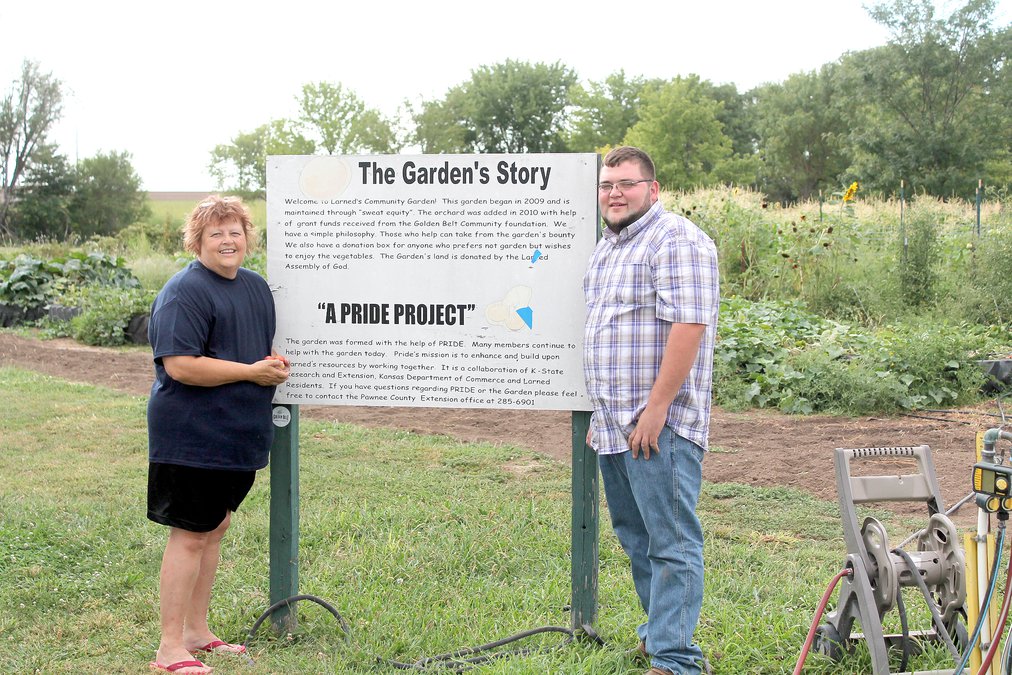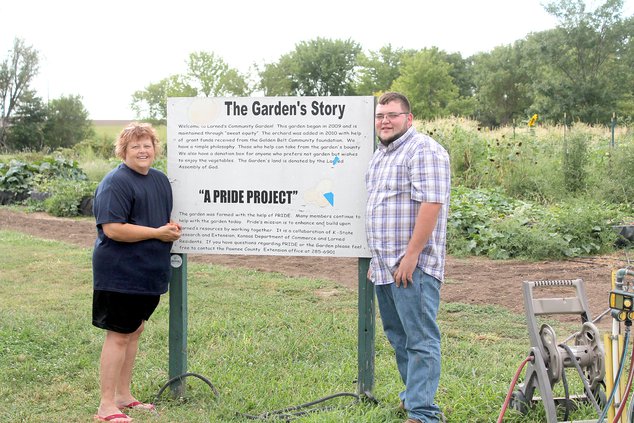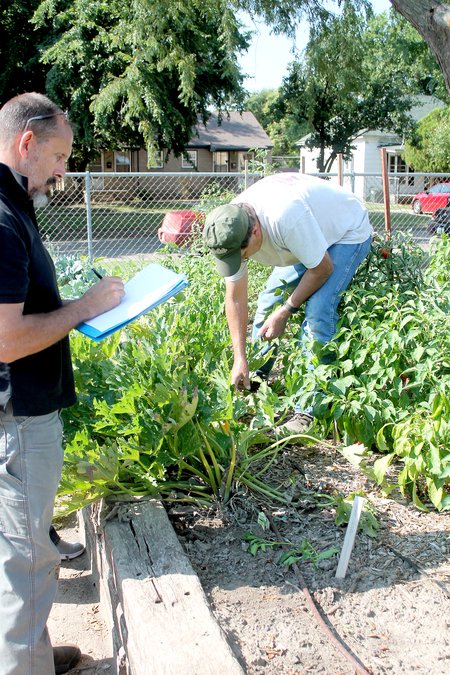The term “community garden” often brings to mind a series of small plots, some well tended, some not, where members grow a variety of produce for their own use. For many, it’s a great option, especially those with the time and the means to travel to their plot but without a suitable space for a home garden. But, it’s not the only way to operate a community garden. This year, three Great Bend groups have adopted a new approach, and as the harvest nears, it’s clear its a winner.
Take a drive past the south yard of USD 428’s Washington School, and you’ll find three raised beds that are brimming with peppers, tomatoes, squash, greens, herbs and more. Led by Barton County Master Gardeners, they and MPAC and Barton County Academy are the groups behind the green. While the gardeners themselves have gained much from the experience, the community is benefitting in many ways.
With nearly 500 square feet per bed, it was too much for BCMG to take on alone. Luckily, two other education-based groups stepped up and volunteered to each take on a bed. Participants in the Migrant Parent Advisory Committee (MPAC) and Barton County Academy, an alternative high school, agreed to join BCMG in the project that has caught the attention of passersby from both near and far.
Cottonwood Extension Horticulture Agent Rip Winkel arranged for the group to begin work renovating three raised beds that had sat idle in recent years. After each bed was cleaned of weeds, BCMG arranged to bring in compost and mulch available free from the city.
The compost was worked into the soil, and then Winkel, a former landscaper, showed participants how to install a drip irrigation system for each bed.
A long strip of weed barrier fabric was run lengthwise across each bed to help keep down weeds in the center where it is hard to reach, and X’s were cut where each plant would be added. After all the plants were in the ground, city mulch was brought in. Spreading it over the fabric and soil on the edges has helped in many ways.


“We use the mulch for three things,” Winkel said. “To keep the plants cool, to lower the pressure of weeds, and to keep the fabric down from all the wind.”
Plants were placed with the tallest, tomatoes, in the center, with peppers and other medium-height plants on either side, and finally vining or low-growing plants on the edges. This way all plants would receive the optimum amount of light, and allow gardeners to easily monitor growth, or the lack of it, so they could respond quickly to the needs of the plant.
Also nearby, the BCMG grew a plot of sweet corn and a plot of butternut squash. Unfortunately, the squash has been plagued by squash beetles, and the corn was stolen by raccoons. Still, gardeners like Gary Weiser, one of the BCMG trainees, managed to take a token harvest from each despite nature’s insistence on getting its share.
KSU trials conducted
Acquiring the plants it would take to fill three large beds could have been a pricey endeavor, but thanks to Winkel’s association with Kansas State University through Extension, all three groups received several varieties of tomatoes and peppers. In exchange for agreeing to monitor growth and yields, field trials of All-America Selection varieties were provided for free.
Winkel and BCMGs have been collecting and reporting data for pre-marketing efforts by educators in Olathe. The AAS trial program evaluates several vegetable crops including tomatoes, peppers, beans, okra, squash and watermelon that seed companies will release to the public in the future.
Many hands make light work
On a recent Friday morning, a handful of BCMG trainees were busy picking and recording how many peppers, tomatoes and squash were ready for harvest.
“We just record numbers because weighing would be impossible,” Winkel said.
The MPAC and Barton County Academy groups are also keeping count and sharing the information with KSU.
Peppers ranged from sweet bells to hot chiles, along with plenty of jalapenos. Winkel was quick with his Swiss Army knife to cut into the fruits and offer a taste to members. It was hard to tell if he was joking when he promised a sweet experience.
“If it were hot, you’d be able to tell from the smell,” he said. Hotter peppers have higher concentrations of capsaicin, the chemical that makes it nearly impossible to stifle a cough when you inhale its gas. It also provides the heat that you experience on your tongue, and the burn that occurs on exposed skin. (It’s a good idea to wear gloves if you’ll be handling hot peppers.)
Meanwhile, BCMG community garden committee members Barbara Davenport, Dianna Scheuerman and Weiser shared recipes and tips on preparing the white, pie-shaped “patty-pan” squash. Depending on the size, the white skin could be peeled off or left on. Scheuerman recommended roasting them with onions and bacon. The texture, she said, was in between a summer and a winter squash.
Weiser spends several hours a week working at the garden, and has put much of his training to work. He pulls weeds, waters and sprays with NEEM oil on a weekly basis. When he runs into challenges, he turns to Winkel and KSU Extension Horticultural Agent and State Master Gardener Coordinator Ward Upham for advice.
Davenport, Scheuerman and Toni Bodine, another committee member, take turns throughout the week, stopping in to activate the drip system and check on plants. With many hands keeping an eye on the garden and sharing the burden of the work, weeds and pests haven’t got a chance of getting a foothold when vacations and life happens for the members.
Sharing the harvest
Once the work was done, it was time to distribute what was picked. With an unproven garden, the groups opted not to formalize how the produce would be distributed. Instead, those who work in the garden and help with the harvest have the first pick, but luckily there is plenty to give away. Most has been given away to people in the neighboring community and to other organizations in the area. Members have also been happy to give back to the groups that have supported them, sharing bags of produce with USD 428 employees at the bus barn who hold the keys to the garden gates, and to others who have supported efforts by donating supplies, Davenport said.
MPAC and Barton Academy, similarly, have shared their wealth of produce through their own channels.
Larned Civic PRIDE garden similar
Great Bend isn’t alone in utilizing community gardens. Twenty minutes down the highway, Larned residents have a similar opportunity. There, members of Larned Civic PRIDE operate a community garden under a simple philosophy: those who help can take from the garden’s bounty. There is also a freewill donation box for anyone who prefers not to garden but wishes to enjoy the vegetables.
“Anyone can come and pick from the garden,” said Kevin Grant, one of the garden committee organizers. He is also a Pawnee County Extension ag agent.
Beginning in April, notices are posted on the group’s Facebook page inviting those who enjoy gardening to come to an annual organizational meeting held in May. Families with children are encouraged to participate, providing young people an opportunity to watch things grow and take part in the harvest.
Formal work days are organized, and those who wish to garden side by side with others can add their name to a list for notifications of when those days are planned. On an early workday this year, members set up the drip irrigation system and planted rows of seeds and seedlings provided through funds raised by PRIDE. As the season progresses, they work together to maintain the garden until harvest. Others, who enjoy the solitary pursuit of pulling weeds and tending to plants are welcome to work in the garden anytime.
Varieties of tomatoes, peppers, cucumbers, squash, melons, corn, beans, onions, potatoes, eggplants, okra, sweet corn, pumpkins and more fill the rows of a vegetable garden measuring at least 75 feet by 75 feet. An herb garden sits adjacent the vegetable garden, with curved beds shaped from what appears to be corrugated metal in a pleasing design. And just a hop, skip and a jump to the west is an established fruit orchard, with apples, peaches, cherries, and more. It’s all up to volunteers to mow and weed and water, so the success of the garden is truly a reflection of the dedication of the membership.
That dedication is high, because each Saturday beginning at the end of June, and going at least through Labor Day, Larned’s farmers market is held at the garden, with vendors offering baked goods and crafts coming on most days. But, PRIDE members don’t need to wait until Saturday.
“This year, we’ve raised over $500 in freewill donations from people who stop throughout the week to pick a few tomatoes, melons, or salad fixings on their way home,” Grant said.
Annual donations pay for seeds, plants, and gas and maintenance for the mowers. The donation box is located on the east side of the produce stand next to the building closest to the garden.
For those interested in becoming part of the Barton County Master Gardener program, applications for the 2019 class will be taken later in the fall. Contact local horticulture agent Rip Winkel via the K-State Research and Extension - Cottonwood Extension District Facebook page.
For those interested in becoming a member of Larned Civic PRIDE, except for the first Monday of the month, Larned PRIDE meets weekly at noon at Pawnee Valley Community Hospital, 923 Carroll Ave., Larned. Membership is free. For more information, contact local FAC Agent Donna Preisner at the Pawnee County Extension office, 620-285-6901. She provides insight and helps oversee all three PRIDE groups in Pawnee County and answers questions.







